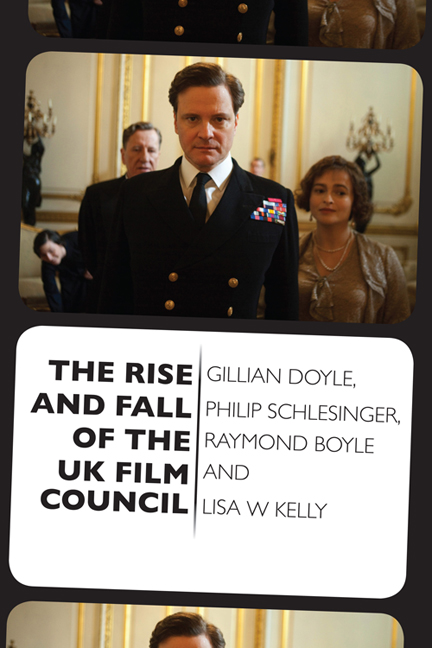Book contents
- Frontmatter
- Contents
- List of Tables and Figures
- Preface
- Part I Background
- Part II Agenda for the UK Film Council
- Part III Impact
- 5 Flying Too Close to the Sun?
- 6 The Production Funds
- 7 Digital – A Missed Opportunity?
- 8 Performance against Objectives
- Part IV Strategic Lessons
- Notes
- Bibliography
- Appendix: UKFC ‘Family’ of Partner Organisations
- Index
5 - Flying Too Close to the Sun?
from Part III - Impact
Published online by Cambridge University Press: 05 September 2016
- Frontmatter
- Contents
- List of Tables and Figures
- Preface
- Part I Background
- Part II Agenda for the UK Film Council
- Part III Impact
- 5 Flying Too Close to the Sun?
- 6 The Production Funds
- 7 Digital – A Missed Opportunity?
- 8 Performance against Objectives
- Part IV Strategic Lessons
- Notes
- Bibliography
- Appendix: UKFC ‘Family’ of Partner Organisations
- Index
Summary
Introduction
The objectives pursued by the Film Council and the way in which it understood and articulated its mission gradually shifted and broadened over time. In this chapter, we investigate how well the Council's evolutionary development served in enabling it to satisfy the differing constituencies of interest that form part of the landscape of film provision. How did it address the various tensions between regional, national, European and international interests in an increasingly transnational film industry? To what extent were the concerns and interests of independent producers influential in shaping the Council's approach? How effective was the UKFC in negotiating and promoting competing economic and cultural objectives? Bearing in mind how the UKFC's agenda shifted over the organisation's lifetime, this chapter considers its performance in handling the main interest groups, concerns and expectations that it needed to take into account in setting out its policy agenda.
Unified Body versus ‘Monolith’
As discussed in earlier chapters, when the idea of setting up a new film support body first surfaced in the FPRG Report, the case put forward for reviewing and possibly rationalising ‘the machinery for providing Government support to film’ centred on how a new unified organisation could ‘provide strategic leadership’, ‘achieve greater coherence’ and help eliminate ‘gaps and areas of overlap in provision’ (FPRG 1998: 50). So, although the ambition that impressed itself most firmly on the organisation's initial raison d’être was that of boosting the sustainability of the UK film industry, the Council was also founded on hopes that a single body with a remit straddling both industry and culture would provide a more effective platform for delivery of public support for film.
The Council managed to take charge of an all-encompassing programme of responsibilities by devolving delivery of various aspects of its remit to partner agencies. As Tim Cagney, the UKFC's head of partnerships from 2005 to 2010, noted, these included the BFI, which covered cultural aspects of the film remit, Skillset, which provided industry training, and the English Regional Screen Agencies, which dealt with film-related development objectives at a more local level (Interview, London, February 2013).
- Type
- Chapter
- Information
- The Rise and Fall of the UK Film Council , pp. 71 - 88Publisher: Edinburgh University PressPrint publication year: 2015



